Every survivor deals with trauma differently. All will carry the scars of what they’ve endured, but how they deal with those scars varies from person to person.
For many, the abuse they’ve suffered serves as a springboard to make a larger change, both in themselves and their communities. Motivated by the conviction that no child should experience the same horrors, they aspire to better the world that crushed them.
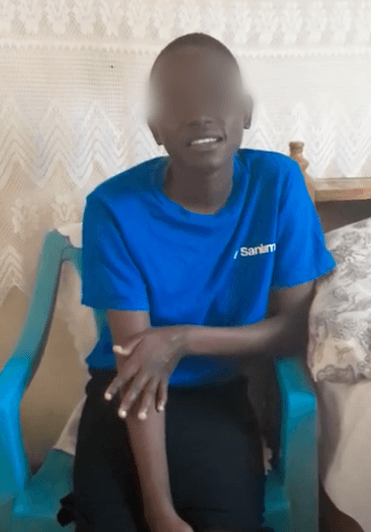
Hamisi during her interview
Hamisi’s story begins like many of our survivors’: with the loss of her parents. In an instant, Hamisi and her siblings were suddenly on their own.
The children moved in with their grandmother, who worked hard to meet their needs. When it appeared that the family wouldn’t be able to afford the reputable boarding school Hamisi dreamed of attending, Hamisi “begged her to just take me to a local school near the village.”
Finally, her grandmother agreed. Neither had any way of knowing the enormous impact that decision would have on Hamisi’s life.
The plan behind the help…
One day, while walking to her new school, Hamisi met a man. He spoke kindly to the girl and seemed genuinely concerned for her wellbeing. Then he did something truly shocking. “He promised to take care of my school fees,” Hamisi says. “(He) promised to take care of everything that I needed.”

According to UNICEF, prior to the COVID-19 outbreaks, primary school enrolment in Kenya was 99%, but only 71% at the secondary level
The innocent child was thrilled: she could get an education, just like she’d dreamed, without burdening her grandmother further, all because of the selfless generosity of a stranger.
Hamisi shakes her head slightly, recalling her naivety. “I trusted this man,” she says. “I did not know that he had a plan behind the help that he was giving me.”
“As time went by, he started asking for some things that I wasn’t comfortable with,” Hamisi says, frowning. “He started calling me to his house secretly, touching me inappropriately and telling me not to tell anyone.”
Hamisi remembers her inner turmoil: “I was getting uncomfortable with this situation. But he was the one paying my school fees. I had to… I just had to cooperate with these things.”
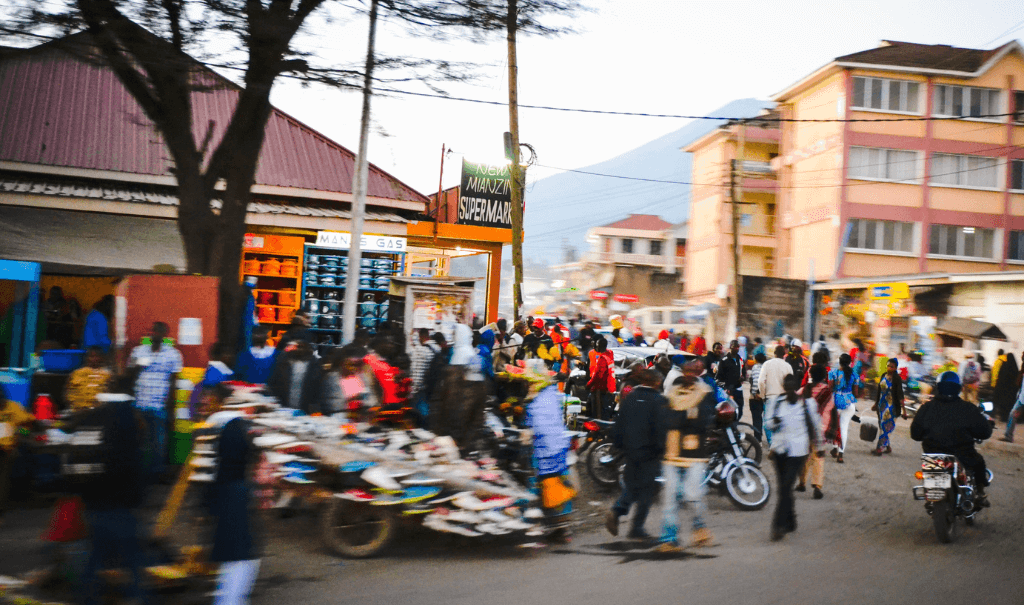
53% of children in Kenya live in multidimensional poverty
Hamisi starts speaking more hurriedly: “One day he called me in his house and told me, ‘I have been paying your school fees without complaining. You have never lacked anything. Sometimes I have even provided for your family. So you have to pay me back.’”
“He forced—” Hamisi cuts off, wincing. When she finishes, her voice is almost whisper. “He molested me without my permission. I did not want to do all of these things, yet he forced me.”
After raping her, the man Hamisi once imagined as a kind beneficiary threatened her, saying he’d kill her if she spoke up. Horrified, the girl didn’t know how to react. With no one to turn to, Hamisi remembers feeling trapped, saying, “I had to stay silent. No one was connected to us.”
And so, isolated and afraid, Hamisi bore the pain of her experience in silence.
“Then I realised I was pregnant.”
If Hamisi felt overwhelmed before, realising she was pregnant was devastating.
“I almost gave up,” Hamisi says, frowning. “I was shattered.”
Her dreams were falling apart. She was traumatised but locked into silence. Her parents were gone, her grandmother worked to the bone to provide what she could. And now that she was pregnant, her prospects of realising her academic aspirations had all but evaporated.
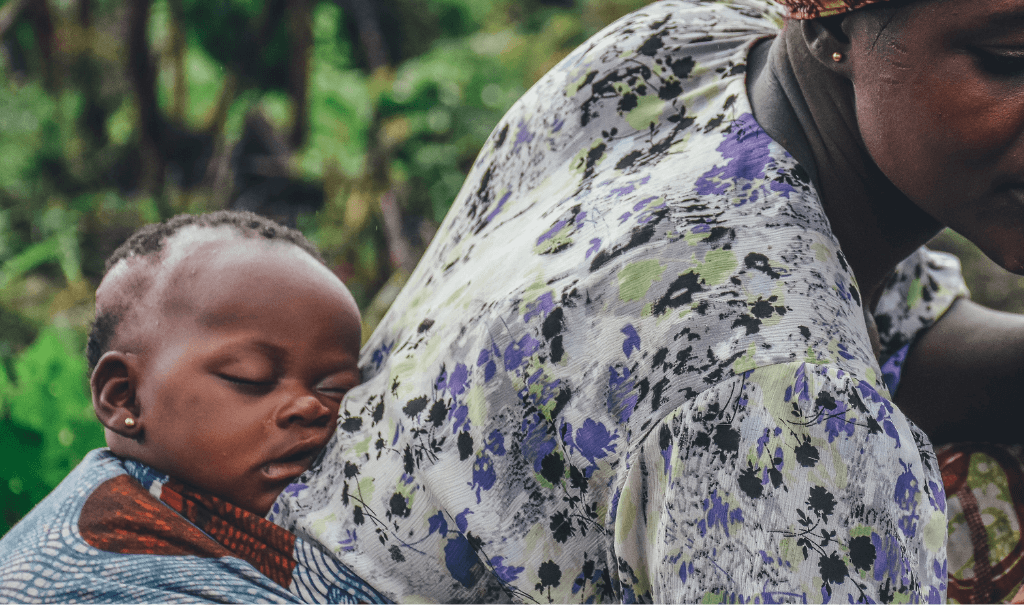
18% of girls ages 15-19 in Kenya will experience pregnancy. Image is representational
Through it all, the abuse never stopped.
The evil man was unfazed by the news that she was pregnant and continued to wield his financial provision for the family like a weapon. When Hamisi tried to refuse his advances, he beat her mercilessly.
The child, once bright, hopeful and ambitious, was broken: “I cried every night, every morning.”
Desperate to salvage what she could of her life, Hamisi began to look for a way out. “I only had one solution in my head… abortion.”
“I wanted to end the pregnancy, but…” At a sound from beside her, Hamisi reaches across the bed next to her chair and picks up a beautiful, squirming baby girl.
“I realised that God would not give me something I cannot take care of,” she says, settling the plump baby in her arms.
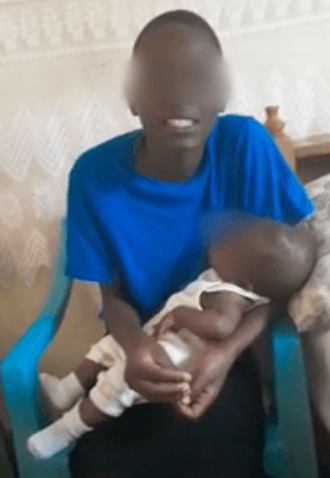
Hamisi and her baby girl
A new path
“In the process of this journey, Destiny [Rescue] helpers came, who located me and came to my rescue,” she says quietly, sweetly fussing over her baby.
These local volunteers, mostly members from partnered churches in the area, seek out children in their communities suffering exploitation. Fuelled by an incredible spirit that’s equal parts courage and compassion, they boldly offered Hasimi a way out of the darkness.
But after what Hamisi had endured, she was hesitant to hope for what Destiny Rescue offered.
“At first, I could not trust them,” she says. “Because, you know, I trusted this man, and he took advantage of me.”
The process of gaining Hamisi’s trust wasn’t easy. “When they came, sometimes I would run and hide because I did not want to face the same situation (again),” Hamisi says.
The selfless mother credits God for her change of heart: “God’s ways are not the same ways as man’s. So… I started trusting them slowly.”
Once she accepted their help, things started changing rapidly. “They gave me a guardian who really was taking care of me,” Hamisi says emphatically.
“The guardians paid my school fees,” she says. “[Destiny Rescue] even opened a business for my guardian to help us with home needs. They watched over me. They would come and ensure that I was safe.”

Small business assistance in Kenya has assisted in a variety of businesses from selling second-hand goods, to commodities and even pharmaceuticals
Now, Hamisi has big plans for the future. Her voice grows bold as she lays out her aspirations. She dreams of becoming a lawyer. “I want to defend any girl that is undergoing the same situation that I am passing through so that I can help those girls who are molested, those girls people are using… those girls who feel like they don’t belong to the world,” she says.
“I want to defend them. When somebody molests a girl, I want to defend that girl in court,” the brave teen says.
She begins to speak more passionately as she describes ending the travesty of rapists walking free while their victims are left “suffering behind.” Hamisi’s expression is intent, her voice sure.

I want to give hope.”
From hindrance to impetus
“You know, it’s so hard, but it’s beautiful to have a baby,” she says. “Having my baby on my arm, looking at her; she gives me hope to keep on moving—to keep on studying so that I can attain that dream.”
Hamisi’s voice becomes impassioned again: “She’s my hope.” She reaches down and pats her baby’s tummy as she speaks. “She is the reason I keep on getting up every morning, seeing that I have somebody who depends on me.”
As the interview concludes, Hamisi reaffirms her resolve to excel. She says she is praying for good test scores to stay on track to achieve her dreams. And she readily accepts the responsibility for those dreams:

I am the only future generation that can make the world better. I can change my situation.”
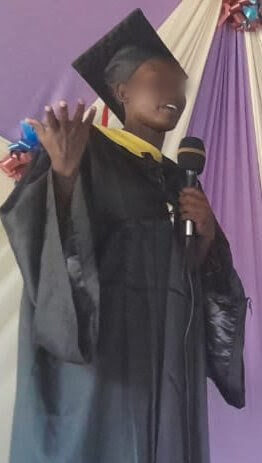
Hamisi boldly addresses the audience during her graduation
In a later post, we’ll share more of Hamisi’s motivational wisdom directed to other girls walking the same difficult road she’s travelled.
Hamisi has the resolve to excel. She has the passion to drive her forward and the discipline to make it happen. Will you help other children like her to get on a path of their choosing?
Fill out the form below to rescue a child today.


 US & International
US & International New Zealand
New Zealand United Kingdom
United Kingdom